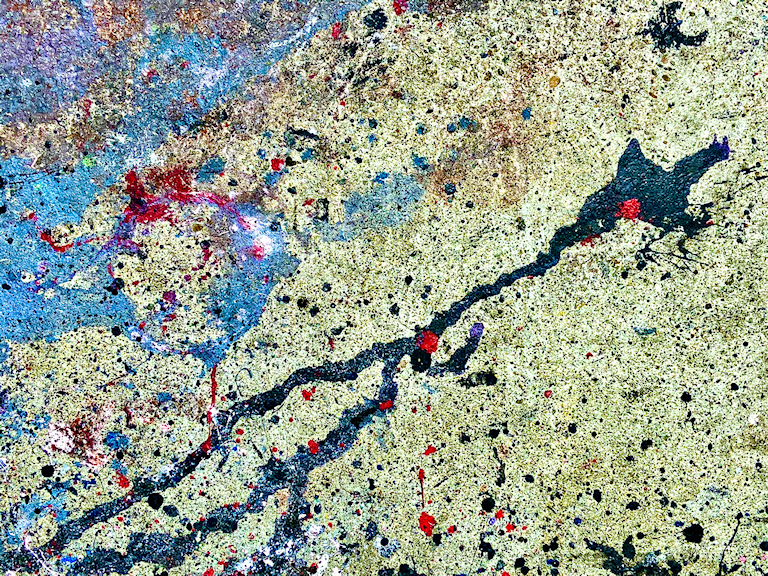“Don’t sleep,” he says. My father’s right arm, a steel rail, reaches across my chest to crank the passenger window down. Darkness floods the cab of the old pickup truck, cold needles of December air, smells of creosote and snow. We are driving the dark roads of the Mojave, looking for my stepmother.
“10-4 on that?”
“10-4. Not sleeping. Over.”
Grime on the cracked windshield, my father’s silver badge sliding on the dash, a Remington 243 with a cracked stock behind my seat. Creeping, the pickup pings and knocks in slow motion down Sunset Road toward Park Boulevard and onto Highway 62—the main artery of the Mojave—and after that, a network of dirt roads named after planets. Our headlights bounce off the occasional mailbox, throw yellow beams through the bedroom windows of sleeping children, cast a searchlight into the crags of Coxcomb mountains in the east.
The Joshua Trees in their bent postures look like people who need help, who are lost, people who thought they knew the way, and now they are thirsty, cold, afraid. Somehow, all of them want a ride from us. I can’t spell “neighbor,” but I know all the stories of people dying a quarter mile from their cars, sometimes much closer, sometimes within arm’s reach. In the desert, distances are shimmery—they shape shift and elude you, slip the cuffs and disappear.
“Spell your first and last name.”
“Lincoln, Adam, Union, Reverend….”
Sometimes he quizzes me on the codes to keep me alert.
“What’s 10-33?”
“Danger. Help me quick.”
She was chopping raw meat with a butcher knife when I came up behind her. I stammered out that she’d hurt my feelings earlier in the day when she’d done such and such thing. Not her child, our signal is weak, our line flooded with static. The knife slammed down on the counter, she picked up her purse from the table, and I followed her out the door. Her white sedan left like a comet, her taillights glittering red and phosphorous, blinking into the night. I stood in our road, waiting. Come back, come back—copy?
“Keep your eyes peeled,” he says, reaching across the gearshift to swat my left knee. He can sense me drifting off by how I breathe. What I hear is: she could be anywhere. She could have ditched her car and be walking on the side of the road. Sitting on a stranger’s porch. Crouching on a boulder at the base of a foothill. Or she’s been abducted, tied up in one of the many deserted shacks that dot the horizon. We should be checking every hovel, every burnt trailer, every cave.
And then white flecks swirl in the high beams, rush the cab and melt on our jackets. 10-13 (weather and road conditions): snow in the desert, silent and rare. My father’s dry knuckles grip the wheel, turn white. Situation normal: all fucked up.
“Don’t go,” I had said, but only after she was gone.
In weather like this, we could hit someone and not know it until we hear the thud and crunch. My father must think this, too, because he slows to an impossible crawl, turns on his brights. A confusion of light bounces off signs for Mars, Jupiter, Saturn. If we go further into the desert, we’ll reach Saturn’s moons—and I’ll never get to sleep.
“10-9—What’s the address again?”
We look for the numbers, but some houses have none. If not tonight, tomorrow, the next day—we always find her or she comes back on her own. I am supposed to say I am sorry I made her leave again, and he’s supposed to say it’s not my fault, that the adult world is a world apart, that her wires are crossed—but there are no clear channels in the gloom of our night patrol.
By midnight, we visit each of her friends we have addresses for: co-workers, some cousins on the mesa, a woman from AA. My father wakes them up with his fist pounding on their doors, and I am not the only kid who will be falling asleep in school the next day, telling teachers something about a man searching for his wife, an old truck rattling through the night, all that static, and oh, the snow, the snow.
__
L.I. Henley was born and raised in the Mojave Desert town of Joshua Tree, California. A mixed-media artist and writer, she is the author of six books including Starshine Road, which won the 2017 Perugia Press Prize, the novella-in-verse, Whole Night Through, and the poetry and art book From the moon, as I fell with artist Zara Kand. Her art, poetry, and prose have appeared in many journals, most recently Adroit, The Indianapolis Review, Waxwing, Diode, Thrush, Ninth Letter, and Arts & Letters. Her essay, “Drive!” was chosen as the winner of the Arts & Letters/Susan Atefat Prize for Creative Nonfiction in 2020. Visit her at www.lihenley.com and follow her on Instagram @lihenleyart.


2 comments
Jonathan says:
Jul 1, 2021
Damn fine writing. Lean, focused, purposeful, and heartfelt. Your subjects are lucky to live in your prose.
Greg Gilbert says:
Aug 25, 2021
Your prose pulls me in, a happy captive. The sense of place and tone are powerful strengths in your story. I remain a fan.